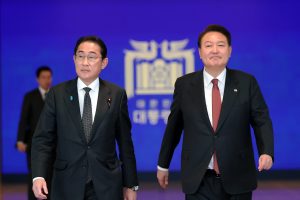Japan’s prime minister will arrive Friday in South Korea for what will likely be the last summit between the two leaders, South Korean President Yoon Suk-yeol’s office said Tuesday.
It said outgoing Prime Minister Kishida Fumio’s two-day visit was arranged after he “actively expressed hope” to end his term on a high note in bilateral relations. In what would be their 12th summit talks, the leaders will discuss further developing two-way ties and strengthening the countries’ cooperation in regional and global issues, the office said.
A series of local election losses earlier in the year sparked calls for change within Japan’s governing party, which was also dealing with a fundraising scandal. Kishida announced in August that he’ll step down after the Liberal Democratic Party picks a new leader on September 27.
“Prime Minister Kishida is expected to continue to provide constructive advice to his successor on foreign policies and the future development of South Korea-Japan relations based on his experience,” Yoon’s office said in a statement.
Hayashi Yoshimasa, Japan’s chief cabinet secretary, said the meeting will be an “important occasion” for the two leaders to discuss further cooperation between their governments in the face of an increasingly difficult strategic environment.
“Japan and South Korea are the two important neighbors that should cooperate as partners in tackling various issues of the international community,” he told reporters.
Since taking office in 2022, Yoon has focused on resolving historical disputes with Japan as part of broader efforts to beef up South Korea’s military alliance with the United States. The countries have strengthened their military and diplomatic cooperation in the face of North Korean nuclear threats.
Ties between Seoul and Tokyo have long been complicated by grievances related to Japan’s brutal rule of the Korean Peninsula from 1910 to 1945, when hundreds of thousands of Koreans were mobilized as forced laborers for Japanese companies, or sex slaves at Tokyo’s military-run brothels during World War II.
Yoon’s most significant move to improve ties came in March 2023, when he announced a contentious plan to compensate Korean forced laborers during Tokyo’s colonial rule that doesn’t require Japanese companies to contribute to the court-ordered reparations. It was an attempt to end a yearslong impasse with Tokyo and solidify three-way security cooperation with Washington.
The plan met fierce opposition at home from forced labor victims, their supporters, and liberal opposition politicians, who have called it a diplomatic surrender and demanded direct payments and a fresh apology from Japan over the issue.
While controversial within South Korea, the decision paved the way for Yoon to visit Japan in March 2023, the first time in 12 years either country had hosted the other’s leader for a bilateral summit. Kishida reciprocated by making his own trip to South Korea less than two months later.
The progress in bilateral relations culminated in a high-profile trilateral summit in the United States in August 2023. From the U.S. presidential retreat at Camp David, the leaders of Japan, South Korea, and the U.S. declared “a new era of trilateral partnership,” underpinned by Yoon and Kishida’s “courageous leadership in transforming relations between Japan and the ROK [South Korea].”
The question has always been whether the progress seen in Japan-South Korea relations under Yoon and Kishida can outlast their respective administrations. Now that will be put to the test as the LDP elects Kishida’s successor.

































